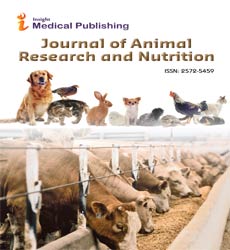Abstract
Effects of Substituting Soybean with Moringa oleifera Meal in Diets on Laying and Eggs Quality Characteristics of KABIR Chickens
Objective: This study was designated to evaluate the effect of Moringa oleifera leaf meal on laying performance of the KABIR strain hens.
Methods: A total of 27 pullets and 3 cockerels were randomly distributed into 3 groups and randomly fed with diets T0, T5 and T10 in which soybean was gradually substituted at 0, 50 and 100% with Moringa oleifera leaf meal (MOL).
Results: The results showed that feed intake decreased with increasing level of MOL. The first egg was laid at 25 weeks in the group of chicks fed with 5% of MOL. The lowest feed conversion ratio (FCR) and the highest egg production were recorded with 5% MOL, while the highest FCR and the lowest egg production were recorded with the highest MOL level (10%). Except for circumference of eggs and the yolk weight, eggs characteristics and hatchability were not significantly affected (P>0.05) by the inclusion levels of MOL in the diet. The mortalities recorded in this study (21, 30 and 37.5% for 0, 5 and 10% of MOL respectively) were above 12% recommended by the IPH (International Practices Hatchery).
Conclusion: It was concluded in the conditions of this study that using Moringa oleifera leaves at 5% in the diet as protein source ingredient can improves egg production in KABIR hens.
Author(s):
Kana Jean Raphael,Keambou Tiambo Christian,Raquel Soares Juliano,Frederico Lisita,Mfopou Youssouf Soultan,Mube Kuetche Herve,Teguia Alexis.
Abstract | Full-Text | PDF
Share this

Google scholar citation report
Citations : 764
Journal of Animal Research and Nutrition received 764 citations as per google scholar report
Abstracted/Indexed in
- Google Scholar
- China National Knowledge Infrastructure (CNKI)
- WorldCat
- International Committee of Medical Journal Editors (ICMJE)
- Secret Search Engine Labs
Open Access Journals
- Aquaculture & Veterinary Science
- Chemistry & Chemical Sciences
- Clinical Sciences
- Engineering
- General Science
- Genetics & Molecular Biology
- Health Care & Nursing
- Immunology & Microbiology
- Materials Science
- Mathematics & Physics
- Medical Sciences
- Neurology & Psychiatry
- Oncology & Cancer Science
- Pharmaceutical Sciences

